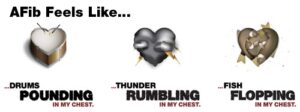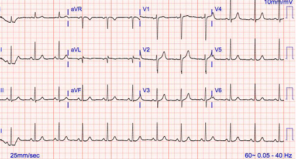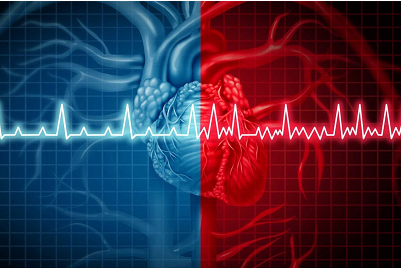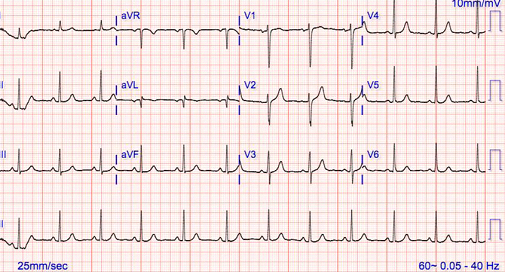
Can Anxiety cause Atrial Fibrillation?
- Post author:admin
- Post published:July 11, 2022
- Post category:Cardiac
- Post comments:0 Comments
AFib symptoms have a lot in common with anxiety symptoms. In fact, they can be so similar that you may not know whether you’re experiencing an AFib episode or a panic attack. Knowing the similarities, differences, and links between the two can help prevent potential complications
Article overview
Most individuals above 60 years old are susceptible to various heart diseases and complications. Atrial fibrillation is a common heart issue that comes with faster and irregular heartbeats. There are several causes of this condition, but most experts have linked it to anxiety.
Anxiety is one factor that triggers Atrial fib because when you have a anxiety related panic attack, it triggers an irregular and high heart rate greater than 120 beats per minute (bpm). Panic attacks resulting from some frightening causes release adrenaline, resulting in rapid irregular heart rhythms. Medical experts reveal that Atrial fibrillation comes with an irregular heart rate that causes an irregular heartbeat. Read through the article to understand more about the relationship between anxiety and atrial fibrillation.

Is it Anxiety or Atrial Fibrillation?
Irregular heartbeats may be a symptom of other medical problems. When having irregular heartbeats, most individuals are usually confused about the difference between Atrial fibrillation and anxiety. Your anxiety may have a medical reason, so before your next irregular or pounding heartbeat understanding their differences.
When distinguishing between the two conditions, it’s essential to understand that Atrial fibrillation will occur when you’ve got the two top heart chambers beating erratically. Usually, all the chambers beat with the same rate. When the condition is at an earlier stage, the heartbeats happen in short bursts and later may become chronic. Symptoms are usually immediate and sharp. Most patients with this condition have also reported weakness, fatigue, dizziness, and chest pain.
In contrast, individuals suffering from anxiety will also experience these signs and symptoms. However, the Afib symptoms are always more severe than the anxiety due to the condition that is causing the problem. Thus, it’s vital to understand the key differences between the two conditions when looking at them.
How can you differentiate between and Anxiety related Panic Attack and Afib?
The primary difference between these conditions is their causes. When looking at these conditions, it’s imperative to understand that Afib comes with a particular physical trigger sending numerous electrical impulses through the heart. This surge of electrical impulses causes the heart to get out of its regular rhythm. The body may not show any warning signs or external factors to alert you of a possible episode when having these symptoms.
Contrary, when looking at panic attacks, the main source of irregular heartbeats is usually a rush in the adrenaline in your body. Afterward, the build-up of the psychological pressure will result in physical pain. This physical pain is usually the leading cause of severe panic attacks. Unlike anxiety, which often has clear triggers, panic attacks occur suddenly and unexpectedly and typically only last for a few minutes.
Diagnosis of Atrial Fibrillation
Most often, Atrial fibrillation occurs when the heart is weakened by coronary artery disease, inflammation, or after heart surgery. Very rarely, Atrial fibrillation can occur without a specific trigger.
Atrial fibrillation: Diagnosis and examination
When dealing with any medical condition, it’s vital to understand the major cause of the condition. Therefore, we’ve got some screening and diagnosis for the medical experts to understand the main cause of your discomfort. When screening for Afib, medical experts use several ways to learn of this condition. The tests include stress tests, blood tests, or chest x-ray. Nonetheless, EKG screening is a common method as its non-invasive, painless, and easy. After screening, the doctor will understand the cause of the condition; thus, coming up with appropriate ways to treat it.
Tips for better heart health Blog
Learn more about 24h ECG Recorder with AI Analysis

What is the Most Common Cause of Atrial Fibrillation?
Various studies have linked Afib to numerous causes, but anxiety is a common factor triggering the condition. Most research and studies link most Afib cases to some form of anxiety. Therefore, the appropriate way to lower the chances of atrial fibrillations is by having a proper mechanism of reducing stress, which can trigger anxiety.
The most common cause of Afib is usually a damaged heart electrical system or heart structure. In addition, the other causes may include family history, heart diseases, high blood pressure, family attacks, and other factors.
Can Anxiety Cause Atrial Fibrillation?
Most individuals have been asking if high anxiety can cause Atrial Fibrillation. Despite the close relationship and similar signs and symptoms, anxiety isn’t the main cause of Afib. Anxiety will only trigger or make Atrial Fibrillation episodes scarier.
Having a panic attack leads to interference of the heart rate, making the Afib episodes more uncomfortable and scarier. Medical experts believe high anxiety levels will trigger your Afib episodes and even make them worse. Therefore, it’s imperative to deal with your panic attacks to help achieve a healthy heart.
Finding a healthy environment plays an important role in easing your Atrial Fibrillation condition.
Relieve Anxiety and Panic Attacks
Medical experts advise that the most effective way to manage Afib is to reduce anxiety levels and stress. Below are the best ways of managing anxiety and lowering panic attacks:
Managing anxiety
The best way to manage your anxiety is by ensuring that you stay healthy by exercising and eating proper meals with nutritional supplements. Staying healthy with meals and exercise helps maintain your anxiety heart rate of less than 120 bpm. Despite exercise being the best way to manage anxiety, you should always focus on choosing methods that help you control and have a steady heartbeat if you have Afib. You can also incorporate breathing exercises, listen to soothing music, and look for appropriate ways of controlling your stressful situations.
Lowering your panic attacks risks
Choosing the appropriate ways to lower your panic attack risks is usually a daunting task. However, it’ll be imperative to look for appropriate ways to help you cut or reduce the different sources of stress. These methods and mechanisms should help you gain physical, mental, and general body wellbeing. You can even incorporate your hobbies or games to help you reduce the risk of panic attacks.
Low cost devices to monitor heart rate and rhythm
-also-
Learn more about 24h ECG Recorder with AI Analysis

Final Thoughts
Atrial fibrillation is a well-known condition that causes irregular heartbeats and high anxiety heart rate greater than 120bpm. Medical experts reveal panic attacks may be a major cause of the condition. However, anxiety occurs with different signs and symptoms. Thus, it’ll be vital for a doctor to screen the leading cause of the condition to develop the appropriate therapy or control. Notably, the appropriate way to control Afib is to manage your anxiety with the EKG Monitors and Heart Healthy Tips above.
Related Blog
What does Afib feel like?
Article overview 1. What is atrial fibrillation?2. Types of atrial fibrillation3. Atrial fibrillation symptoms4. What does atrial fibrillation feel like?5. How long does it last?6. Factors causing atrial fibrillation7. Atrial fibrillation potential complications8. Diagnosing Atrial Fibrillation What is atrial fibrillation?...
Electrocardiogram (EKG or ECG)
ECG or EKG stands for electrocardiogram and refers to an examination method in which the electrical activity of the heart is measured. The action of the heart is measured with electrodes and recorded in the form of curves. Based on...





